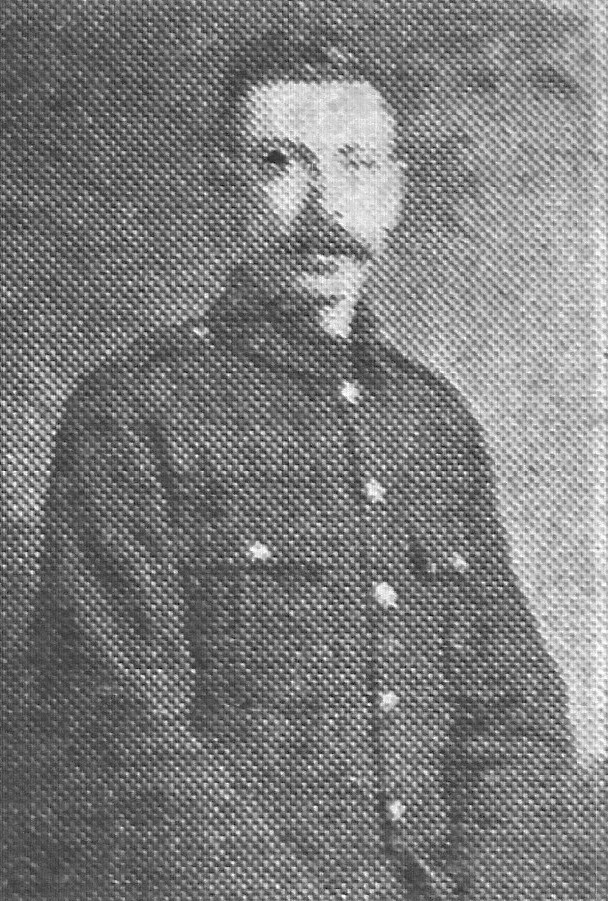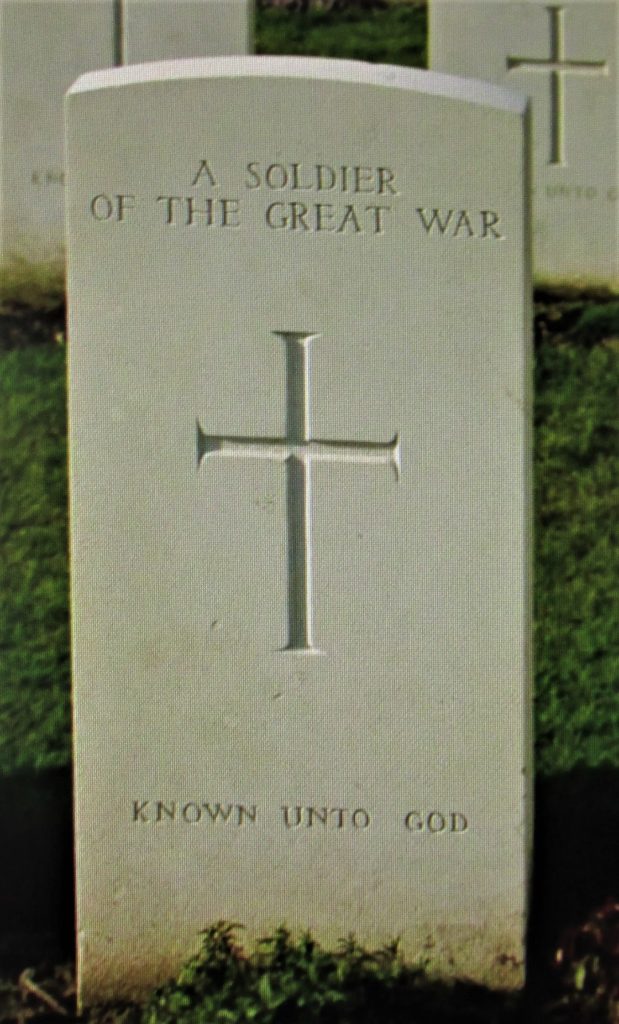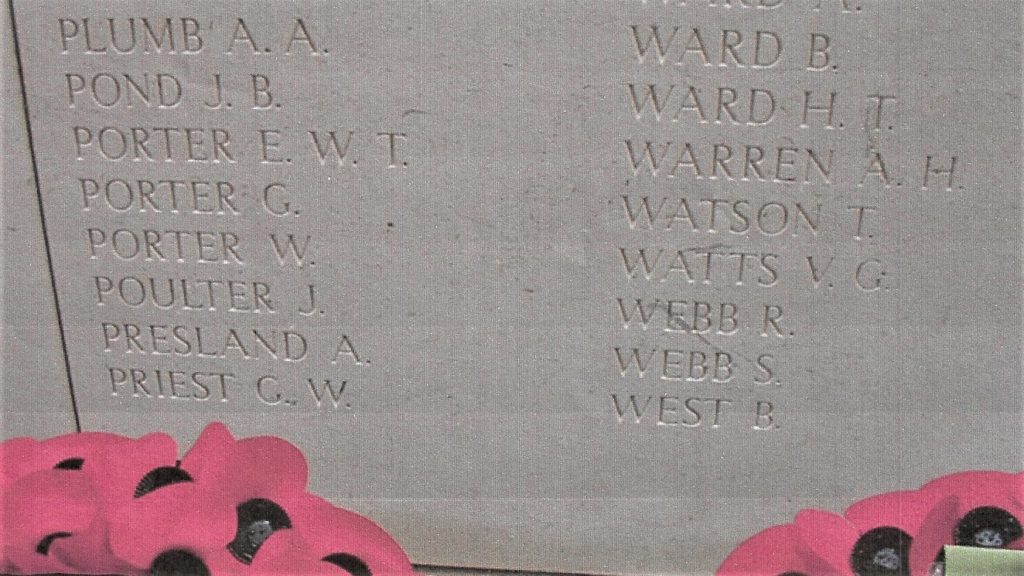3/10098 PRIVATE HORACE THOMAS WARD
‘A’ COMPNY 1ST BATTALION SUFFOLK REGIMENT
KILLED IN ACTION
8TH MAY 1915
AGE 33 YEARS
Horace Ward was born in the Suffolk coastal town of Aldeburgh during the fourth quarter of 1881, the fifth of eight children of William, a brewer and innkeeper and his wife Charlotte (née Austen). At the time of the 1901 census William and Charlotte are listed as being the licensees of the Rose and Crown public house, located at 130 Chediston Street, Halesworth, Horace had remained in Aldeburgh employed as a domestic gardener while living with his elder brother Walter and his wife. During the following few years he joined his parents by moving to Halesworth where he found work as a maltster’s labourer, employed at the maltings of James Parry and Sons. While there he was possibly encouraged by the owner’s son, Richard Parry, to join the town’s part-time defence force of ‘F’ Halesworth Company, 1st Volunteer Battalion, Suffolk Regiment, in which Richard was an Officer. Also, while settling in the town, he met and began to ‘walk out’ with Louise Cobb who hailed from the nearby village of Bramfield. In an article published in the Halesworth Times newspaper of 31st July 1907 it was reported that Horace’s father William had appeared in front of the Licencing Committee at Ipswich where they had to decide if his publican’s licences should be renewed. Various people spoke out against this, with the local police Inspector Berry, claiming that the Rose and Crown was within a hundred yards of three other public houses and also a grocer’s store that held a licence to sell beer and spirits. He strongly recommended that William Ward’s licence be revoked. This number of ale houses in Chediston Street could well explain why the street had earned such a bad reputation, as described in some of our other stories. Speaking in William’s defence had been a Mr Hill, the local manager of the Colchester Brewing Company, which owned the Rose and Crown. His arguments convinced the Chairman and members of the board to re-issue William with his licence. All of the stress in what had been a very trying time for Horace’s parents could well have contributed to William’s early death on 4th February 1908. At the reading of his will it was found that William had left a not inconsiderable sum of money for that time, in excess of two hundred and eighty pounds, to be shared between his family, With his windfall and now becoming fond of Louisa, Horace then planned to marry her. It was around this time that the news of the disbanding of the Volunteers became known with their replacements being the new Territorial Force. Having recently lost his father and with his mother and younger sister Daisy now possibly depending on him he did not transfer his service to the Territorials . In the fourth quarter of 1908 Horace and Louisa married. They moved into 129 Chediston Street, right next to his mother’s pub. It appears that the next important event in Horace’s life occurred on 15th November 1913 with the birth of his only child Vera May.
At the outbreak of war (soon to be known as the Great War) on 4th August 1914 the residents of Halesworth soon showed their support for the country’s armed forces. One such resident was Mr Fred Lambert, the owner of the tobacconist shop at 54, Thoroughfare. As a member of the National Reserve he immediately stepped forward to offer himself in the role of the Halesworth and District recruiting Colour Sergeant (see his son’s, Edward’s story). The Halesworth Times newspaper of 15th September 1914 reported on a parade organised by Colour Sergeant Lambert on the previous Friday where, after speeches by some of the local dignitaries, a party of seventy-two men from the district had marched behind the town’s band to the railway station having been cheered all the way by residents of the town, to start their journey to become soldiers. Among their number were some twenty-nine men from the town, including Horace with the remainder coming from nearby villages. After arriving in Ipswich and passing the medical examination, he was enlisted to serve as 3/10096 a Private Soldier in the 3rd (Reserve) Battalion, Suffolk Regiment, at this time based at Felixstowe on the Suffolk coast. No doubt due to his previous service in the Volunteers he quickly passed through basic training, before being drafted to join the 1st Battalion, Suffolk Regiment. This was a pre-war Regular Army battalion which had been rushed back to England from overseas garrison duty in Khartoum in the north African country of Sudan. They landed at Liverpool docks on 23rd October 1914, before being sent to Felixstowe. It would have been while they were there that Horace was among a large group of freshly trained recruits who were posted to join them. During the first six months of the war the British regular army troops, backed up by territorial battalions who from mid-September 1914 had then made up the British Expeditionary Force who along with their Belgium and French allies suffered a series of crushing defeats by the German forces. At the start of the new year of 1915, the allies had managed to slow the German advance, although more reinforcements were urgently needed. The 1st Suffolks, now allotted to the 84th Brigade of the 28th Divisions, crossed to France on 18th January, landing at Le Havre where, shortly after disembarking, they had been transported by rail to the French town of Hazebrouck. Here their part in World War One would begin. Over the remaining days of January 1915 the men of the battalion prepared their equipment and themselves for battle, undertaking several arduous route marches, together with practice in the art of digging and reinforcing trenches. On 2nd February the 1st Suffolks moved to the Ypres front, where they would remain over the following months it would have been during this period that any thoughts the new recruits may have had about the glamour and excitement of war were quickly dispelled, with many hours spent standing at the trench parapet waiting for something to happen while freezing cold and soaked right through. On 8th May 1915, the day of Horace’s death, the Germans began yet another day with a very intense artillery barrage, fired by both heavy and light calibre guns. Much of this was directed onto the battalion’s section of the front line. This had then been followed up by the use of the new terror weapon, poisonous gas which, prior to the introduction of effective gas masks, caused many thousands of casualties to friend and foe alike. By the end of that day the 1st Suffolks, as reported in the Regimental History of the war published in 1928, had lost over four hundred all ranks. Included in this total were two of the most senior men in the battalion: the Commanding Officer, Lt Col W B Wallace, and the Regimental Sergeant Major, WO1 M S Chase. Sadly also included in their losses was poor Horace. The Halesworth Times of 25th May 1915 included an article in which Louisa related how she had made enquiries concerning her husband, who she had not heard from for some time. His Company Commander, in writing a reply, stated that he had now been classified as ‘Missing in Action’, and that it was possible that he was now held as a prisoner of war in Germany. In an obituary published in Lambert’s Almanack of 1916 it was stated that his wife had now received confirmation that Horace had lost his life. Shortly after, Louisa applied for and was granted a war widow’s pension of 17s6d (88p) per week for her and young Vera, with a final war gratuity sum that totalled £4.10s.9d (£4.54p) having been paid in August 1919.
As well as the above financial awards Louisa would have been able to claim Horace’s medal awards of the 1915 Star medal trio with his named memorial plaque and scroll.
The location of these is not known.
At the end of the Great War and for several years after, as the battlefields were being cleared the unidentifiable remains of thousands of soldiers were found. Many of those were buried in a grave marked with a headstone with the simple text of ‘KNOWN UNTO GOD’. This could well have been the fate of Horace. He is remembered today on the Ypres (Menin) Gate Memorial to the missing.



